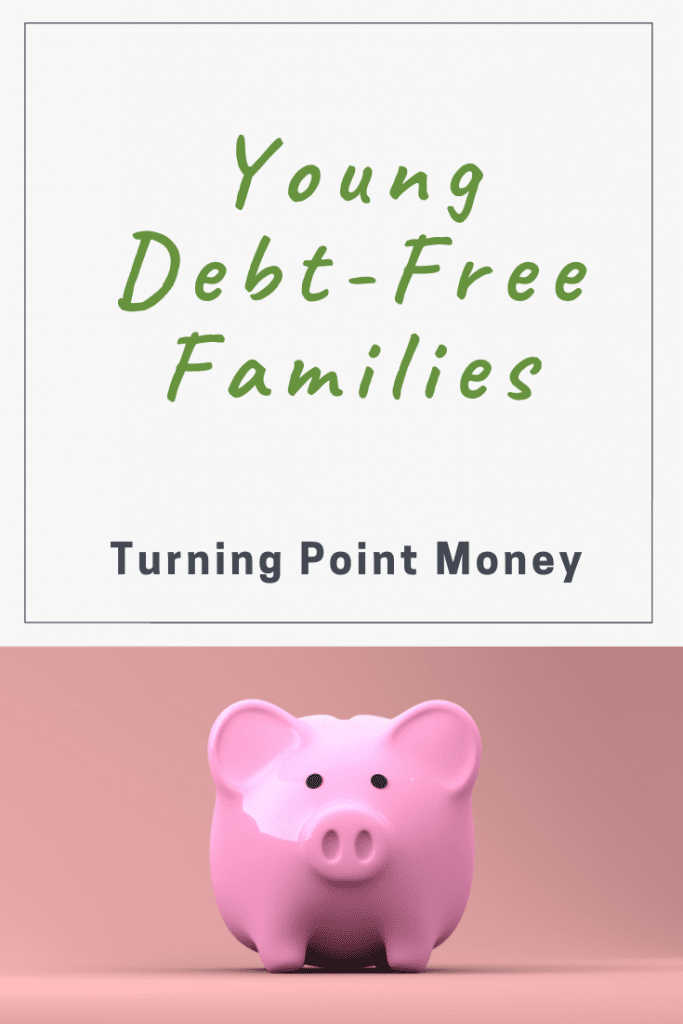This week we are excited to share another story from our Young Debt-Free Families interview series. Turning Point Money (TPM) joins us to share his family’s debt free living story. This story provides insight into his family’s personal journey to pay off their mortgage. While TPM fully acknowledges that he could likely make better returns in the stock market via stock picking, his family’s decision to pay off the mortgage met other goals such as reducing monthly expenses and reducing their risk profile.
I can really relate to TPM’s story. I also work at the intersection of IT and finance, which is where his career grew before taking time off to stay at home with children and focus on stock picking. His children are about the same age as mine, so I admire the family-first approach that is weaved throughout his story. It appears that every decision he and his family have made along the way have been in the best interest of their children.
While I’m not usually an advocate for investing in individual stocks, there are certainly exceptions. Index fund investing is great for people like me (and most of you) that don’t have the time to thoroughly research companies to invest in. However, TPM admits to reading and researching for hours on some days to determine where to invest. He also fully acknowledges the risk and volatility involved with picking individual stocks. This is much different than others who speculate and pick individual stocks (or other “investments” such as cryptocurrency) without doing their homework. Individual stock picking can be very lucrative for people willing to put in the hours of homework to make it work.
I won’t spoil the rest of TPM’s story. Please read on to learn more about TPM and his family. I hope you enjoy it as much as I did!
Debt Free Living with Turning Point Money
1. Start by telling us about yourself. Please include any details you feel comfortable sharing about your family, job situation, income level, and amount of debt paid.
Hello! Thanks for taking a moment to read about my family’s debt free journey.
I am TPM and I write anonymously on TurningPointMoney.com. The reason I choose to write anonymously is because I share more financial details than I care to disclose to friends, colleagues and family. I share these financial details with the hope to inspire others. Individuals, raising a family, can become debt free and also strive for financial independence.
I have been married for almost 15 years, and have two wonderful children aged 7 and 5.
My career went from software engineer, back to school for an MBA, 5 years in management/IT consulting and then working in IT for a large corporation for many years. Eventually I started my own consulting company after moving into management and not enjoying it as much.
My career has always been focused on growing as a process and as a technology expert bridging IT and Finance/Accounting.
Last year, I did not have any earned income.
My last full time job was as an IT Director, with total compensation just under $200k. When consulting, I usually find rates around $110 to $150 per hour, but I haven’t been taking contracts lately.
Over the years, my side hobby has been stock picking. This is where I focus most of my effort these days. My time is spent reading, writing, investing and being the primary caretaker of our children.
Mrs. TPM is a mid-level executive. She loves her career. I am not willing to share many details other than she is still fully employed and her income is more than we spend in a given year.
Our Debt History
Student Loans
Upon graduating from college, I had $25,000 in student loan debt. I froze this debt before I went back to school for my MBA. The MBA program I enrolled in, was for free, so I didn’t incur any more student loan debt. I paid this debt off, 2 years after completing my MBA.
Mrs. TPM had parents who paid 100% of her way to college.
Auto Loans
As a new kid out of college, I splurged and bought a new car and financed it for 4 years. A Chrysler Sebring. I think the payment was around $400 per month. That was the last car I ever financed.
Today, we have 2 average SUV’s to haul kids around. Both were negotiated, bought new and paid for with cash. They are now 8 and 6 years old. We have no intention to upgrade any time soon.
Mortgages
House 1:
Our first home, we purchased at the peak of the market in 2006. It was a townhouse in a lovely community next to a state park. We were forced to sell it at the bottom of the financial crisis, when we were relocated for work. The sale price was $50,000 less than what we paid for it. Luckily during the relocation process, the company paid us what we originally paid for the house, saving us from taking a major loss.
They lost money on that transaction, but it was part of the relocation assistance. What a relief that was. At that point in our financial life, we had only saved our first $100k. Losing $50k would have been a major set back.
In hindsight, we may not have relocated if our house had not declined so much. Getting out was part of the motivation for us to leave. Fortunately we did. We love our new location so much more.
House 2:
Our 2nd home, we had to buy in 7 days. If you ever relocated somewhere you never visited before, you know how extremely stressful the whole process is. You need to pick a location, school district and find a house within a week. We found something that checked most of the boxes, but had a small living space and barely any backyard.
Once we had kids, it quickly got claustrophobic. We suffered in the small space for 4 years, but ultimately decided to upgrade.
The 2nd home, we sold for $520k. We originally purchased it for $397k and had an outstanding mortgage of about $270k, when we sold.
House 3:
This will be our final home that we raise our family in. We purchased the 3rd home for $840k, actually this purchase occurred before we sold the second home. I had a large gain from the sale of a stock that had run up many multiples. I ended up putting down $370k in cash on the new property leaving the new mortgage balance at $470k.
After we sold the 2nd home, I infused the $200k of equity we had from the sale of the second home and paid it down on the $470,000 new balance. What remained was a mortgage of $270,000 on the new property.
I didn’t like our new mortgage payment, so after I paid the $200k extra principal payment, I asked for a mortgage recast from our lender. If you are unfamiliar with a recast, I essentially kept the old loan, but they reamortized the loan on the lower principal value. This lowered our monthly payment considerably, from about $3,600 per month to $2,600 per month. A recast avoids having to refinance the entire mortgage, saving you on all the fees and closing costs.
Before I get to how I ultimately decided to pay off our mortgage, let me briefly share our 2020 covid story.
Investing during coronavirus was painful. I watched my portfolio of hand picked stocks drop over 50% in a few weeks in March/April of 2020. I had a distressed retailer (who ultimately declared bankruptcy) and a couple oil companies in the portfolio. They tanked, one or two stocks were down 95%.
At the bottom of coronavirus, I made some decent stock trades and added a large stake in Pinterest. Pinterest has grown 400% over last year. A few other stocks went up 200% or more.
It was a roller coaster year.
Ultimately, I ended the year beating the S&P by 5%, after one of my most painful investing years on record. But, as an investor, this is what we signed up for. Volatility.
I wasn’t and still, I am not confident everyone knows the full damage to the economy from Covid. Therefore, I decided to sell some stock, mostly to offset my large loss on a few companies I had to liquidate. I did this for tax loss harvesting reasons. This left me with $240,000 sitting in cash at the end of the year.
It was a hard decision, reinvest the money or find peace of mind and pay down debt. Either way, I was extremely fortunate (lucky) to be in the position I was after the horrific year.

2. What inspired you to payoff your debt? Did you have a specific moment where you decided to make it a goal to payoff your debt?
We were faced with a decision, and one I don’t take lightly. Use this money to:
- Continue stock investing
- Improve our lifestyle by installing pool or buying vacation property
- Pay down the mortgage, reduce risk and improve our monthly cash flow
Many people are faced with capital allocation decisions like this. Where to put your money to better position your family going forward?
While our kids would love a pool right now and something we want to provide for them, it is something that can wait for a year or so.
We could keep investing the money in stocks and probably will outperform the return we get from paying our mortgage, but this is not guaranteed and we already have a large portion of our net worth invested in equities.
Given our current circumstance of me being at home with the kids and not grinding away in corporate America, I thought, why wouldn’t we want to reduce our monthly expenditures, pay down the mortgage and lighten our risk profile.
That’s exactly what we did. Starting in 2021, we had $37,000 of mortgage left after using the money from stock sales and paying down debt. This remaining $37k was paid off by depleting some of our emergency fund and allocating a portion of Mrs. TPM’s annual bonus from work by the middle of February.
We are completely debt free!
3. How did you stay disciplined throughout the process to pay down your debt?
Honestly, I wasn’t extremely focused on debt pay down because low cost mortgage debt isn’t the most evil debt, like credit card debt. Fortunately, we never went down the path of credit card debt.
I am a decent investor and focused on growing my investments. I used proceeds from a few good investments to pay off debt.
4. What advice would you provide to other young families who are overcome by the stresses of debt?
Debt avoidance at all costs.
When I started out in my adult life, I financed everything. I financed my first car. I financed a new TV. There isn’t much that I did not finance. Why not? I graduated and started making money and was young, and could pay it all back later.
I soon realized with all this debt repayment, I wasn’t reaching my savings goals.
It was impossible.
If I continued with my spendy ways, I would be on the path of a debt death spiral.
I stopped taking on new debt. Over time, eventually everything was paid off and we were able to save thousands of dollars per month even after maxing out our 401k’s.
This entire process had me think about the order of investments to maximize our wealth creation.
5. What was the most challenging part in your journey to become debt-free?
Changing my buying behavior. I am naturally a decision maker. Once I make a decision I want to act, immediately.
With consumer purchases, this is not a good trait to have.
I had to learn how to delay gratification. This was not natural for me.
I decided to only buy a consumer item, if and only if, I could pay for it in cash and it would not impede whatever financial goal I was working on.
This change really saved me from over buying. For example, when buying a car, we could finance a fancy vehicle. When buying in cash, it forces me to think about what we really need. A Toyota is just fine.
6. How has becoming debt-free changed your family’s life? How do you expect it will impact your family’s life going forward?
I expect the biggest change is that we don’t need two incomes any more to meet our goal of financial independence in the next 5 years.
We can focus our time and effort on the kids.
We can also spend our time more on what we are passionate about. For me, I love investing. I can read about investing for 4 or more hours per day.
We can improve our lifestyle. I plan on playing golf more (with the kids) and sending us on more adventures. They have yet to leave the USA. We want them to see other cultures and places. We now have more budget for this.

7. What are future plans for your family after becoming debt free?
The first plan is not adding new debt.
We plan to continue on our journey to financial independence and focus on raising our kids for the next 10 years or so until they go off to college.
My hope is that being debt free, enables us to splurge over the next 10 years on making wonderful memories with the kids. I hope they look back fondly on our future family adventures. Whenever travel is back on the table after Covid, that is.
8. Are you pursuing (or have you reached) financial independence?
Yes, I love the idea of FI. The definition of FI matters.
I have already left my career and am focusing on investing. Investing is where I am passionate. To me, it is a lifelong quest of expanding my knowledge base, reading about interesting things and getting a little better every day. Once in a while I deploy some money. I hope to do this well into my 80’s.
So, if the definition of FI is having enough to do what I want, I already am there.
Many people believe FI is about being able to support ourselves indefinitely without employment. We are not there yet. Maybe in a few years.
Even if we were, I doubt we would want to retire completely. There are still many goals we are planning for.
Over time, I plan on transitioning our investments from a pure accumulation strategy to one that is more focused on income generation. The biggest issue with focusing on income right now is taxes. We don’t need the extra income and the income is taxed heavily.
9. Is there anything that you haven’t yet covered that you’d like to share?
The hardest part of improving your finances, whether you are paying off debt or saving for your future, is actually getting started. The initial phases aren’t that meaningful. Over time, the small steps you took begin to compound.
I found writing down exactly what I wanted, and measuring as I went along, kept me motivated over years. It’s easy to lose your way. Having something to look back on can be a great reminder of what is important.
10. Where can we learn more about your story?
Please join me on my blog at Turningpointmoney.com and follow my journey to FI. You can also follow me on Twitter. From time to time, I share some interesting things that have crossed my desk.
THANKS TO TPM FOR BEING WILLING TO SHARE HIS FAMILY’S STORY ABOUT stock picking to debt and mortgage freedom. IF YOU ARE A DEBT FREE FAMILY AND WOULD LIKE TO SHARE YOUR STORY PLEASE CONTACT US. THANKS FOR READING!


Mark is the founder of Financial Pilgrimage, a blog dedicated to helping young families pay down debt and live financially free. Mark has a Bachelor’s degree in financial management and a Master’s degree in economics and finance. He is a husband of one and father of two and calls St. Louis, MO, home. He also loves playing in old man baseball leagues, working out, and being anywhere near the water. Mark has been featured in Yahoo! Finance, NerdWallet, and the Plutus Awards Showcase.


I love that you pulled the trigger and paid off your mortgage. I have been slowly chunking away at my mortgage, and have been tempted to do that but given that I FIREd a little bit unexpectedly, we are now using all of our cash to live off of.
However this is something that I’ll be looking very closely at over the course of the next few years at the very least pre-paying a bulk of it to speed up my mortgage significantly!